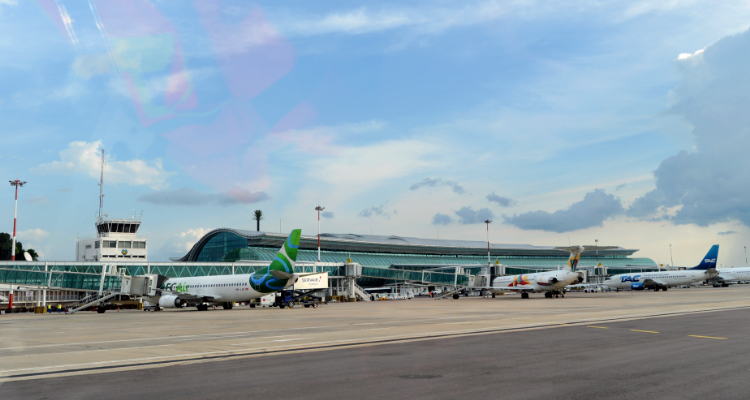CASE STUDY: SEGAP

THE COMPANY:
- Company: Société d’Exploitation et de Gestion Aéroportuaires (SEGAP)
- Region: Sub-Saharan Africa (West and Central)
- Countries: Côte d’Ivoire and Congo Republic (and previously Gabon)
- Sector: Aviation - Airports
- Size: 3.4m passengers in 2019
- Investors: AIIF3, Egis
- Investment: Equity
SEGAP’S STORY
Société d’Exploitation et de Gestion Aéroportuaires (SEGAP) is a pan-African airport operator with investments in West and Central Africa. A long-term partner to governments and airport stakeholders, SEGAP is a pioneer in the African airport landscape. Libreville was one of the first airport concessions in Africa and SEGAP was instrumental in getting its ICAO certification, making it the first airport in central Africa to obtain this certification.
AIIM’s investment in SEGAP was motivated by the significant potential of African aviation. Airports are attractive infrastructure assets with a link to GDP growth and natural currency hedges since the industry is largely dollarized. The company remains 50% owned by the Egis Group, an experienced airport operator with a long track record in Francophone Africa, currently managing 17 airports worldwide. In Egis, AIIM has found a strong partner with operational and technical expertise. With the financial and strategic support of its two shareholders, SEGAP is actively looking to grow its portfolio of airports on the continent.
IMPACT HIGHLIGHTS
- 21 June 2018 - AIIM acquisition of a 50% stake in SEGAP, through African Infrastructure Investment Fund 3 (AIIF3)
- Félix Houphouët Boigny International Airport in Abidjan, Côte d’Ivoire is Africa’s only airport with Level 3+ Airport Carbon Accreditation
- Léon-Mba International Airport in Libreville, Gabon was the first airport in Central Africa to achieve ICAO certification (before handover of the concession in late 2018)
THE COMPANY VIEW
Frédéric Mor, CEO of SEGAP:
“We remain committed to making air travel more accessible in Africa and improving the quality of service for passengers and airlines. We are delighted to have AIIM as our partner. With its track record, industry experience and regional insights, we believe AIIM is the right investor to support SEGAP’s growth plans.”
THE ROLE PLAYED BY PRIVATE EQUITY
Currently, only 11% of African airports¹ involve private investors, compared to 75% of European airports and 43% globally, so the potential for private equity in this sector is considerable. Strong economic growth and a rising middle class with a growing appetite to fly, are contributing to the development potential of this sector, and liberalization of the air transport market in Africa will provide further opportunities for growth and improvement of connectivity in Africa.
Significant investment in Africa’s airports is needed to boost regional and international trade, and to support more tourism from within the continent and overseas. The majority of Africa’s airports were built in the middle of the last century and need urgent investment to meet safety and security standards. But not just capital is needed. SEGAP’s mission is to accelerate airport infrastructure investment on the continent and to achieve operational improvements through its technical expertise, as many of Africa’s airports still lack the necessary technical capacity and regularly underperform in surveys on quality of service. SEGAP aims to improve the experience for passengers and airlines, achieve greater operating efficiency through knowledge transfer and international best practices, increase traffic through pro-active route development and strengthen safety and security.
AERIA traffic has continuously grown by 15% per year over the past 8 years, and in 2016 and 2018 Félix Houphouët Boigny International Airport in Abidjan, Côte d’Ivoire was awarded the Routes Africa Marketing of the Year Award, confirming its status as a leading hub in Africa.
The recent COVID-19 pandemic triggered various financial support measures by governments across the continent to revive economies and provide social assistance, leaving public finances vulnerable. At the same time, the pandemic has had a devastating impact on the global aviation sector. SEGAP is well equipped to provide much-needed funding for airport investment and support the recovery of airport infrastructure with a view to future-proofing operations.
A FORCE FOR GOOD
Airports have a significant role to play in the economic growth of African nations. Through the modernisation and improved efficiency of its airports, the continent will become more connected boosting tourism as well as regional and international trade.
AERCO and AERIA together invested more than EUR160m to improve both the quality and safety of airport infrastructure. But the investment also extends to human capital as demonstrated by AERIA shareholding in the Aviation School in Abidjan which was established in 2017.
In keeping with AIIM’s support for environmentally sustainable developments under our ESG practices, sustainability is a key priority for SEGAP. Abidjan’s international airport was the first and only African airport to date to achieve Level 3+ Airport Carbon Accreditation, following the installation of a new energy management system, the deployment of LEDs and sensors for lighting management, in addition to awareness campaigns on energy consumption related to lighting usage and air-conditioning.
In order to empower its portfolio companies in relation to environmental and social topics and drive both innovation and best practice, SEGAP initiated the implementation of ESG board subcommittees both at AERIA at AERCO. With the support of both SEGAP and Egis, AERIA set up an environmental management system that integrates areas including noise management and environmental relations, air quality and waste water quality, sustainable waste management and prevention of animal hazards.
¹ by traffic volume – Airports Council International 2018
